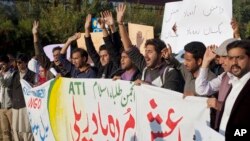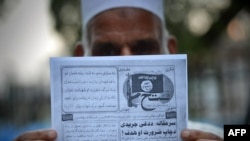A state law minister said Monday that around 100 Pakistanis have left the country to join Islamic State fighters in Syria and Iraq.
Rana Sanaullah, Punjab's law minister, also said 42 Pakistanis were arrested in recent days for trying to establish IS sleeper cells. The raids came in four Punjab cities over the weekend and IS literature and weapons were found, he said.
"According to our probe and investigation, those who left the country to join the IS are not more than 100," Sanaullah said.
It is the first time that a senior minister has released figures about Pakistani citizens who left the country to join IS.
Pakistani officials have consistently denied that IS has a presence in the country. But recent arrests, raids and intelligence reports indicate IS may be gaining a foothold, analysts and government critics say.
No ‘footprint’
Despite his revelations, Sanaullah attempted to downplay IS's presence in Pakistan, telling VOA's Urdu service that unlike many other countries, there is no IS "footprint" in Pakistan. He said only a few Pakistanis have been lured through social media or literature to join IS abroad, and that does not mean the group has a presence in the country.
"Hundreds of people from different countries have fled to Iraq and Syria to join IS," he told VOA. "However, only a very few Pakistanis have left the country in hopes of joining the militant group."
Sanaullah said the group has no network inside the country that could plan or carry out terror activities.
Among the 42 detained over the weekend were alleged IS Islamabad chief Amir Mansoor; his deputy, Abdullah Mansoori; and the group's chief for Sindh province, Umer Kathio, officials say.
Previous arrests
The raid came days after Pakistan's counterterrorism authorities told VOA that they had arrested a group of 13 suspected militants last week and accused them of operating a recruiting and training facility for IS in Punjab state.
Security forces found "an underground training center and seized automatic weapons, communication equipment, bomb-making material, laptops, CDs containing IS propaganda material, maps of Pakistan military's bases and other facilities," the officials said, requesting anonymity.
The officials told VOA the suspects confessed that they pledged allegiance to IS leader Abu-Bakr al-Baghdadi. One of the detainees facilitated contacts between the suspects and a Pakistani national who was in charge of recruiting Pakistani militants to Syria.
The man helped nine suspected militants reach Syria through Turkey, Pakistan's Dawn newspaper said, citing official documents.
Turkish officials arrested two Pakistanis last week, along with a Briton, in Istanbul for links to IS.
And according to Pakistani news reports, three women, along with their children, reportedly left Punjab's capital city of Lahore recently to join IS in Syria and Iraq.
Authorities in Karachi last month discovered a network of women raising funds for IS. And Pakistan's Counter-Terrorism agents apprehended a suspect last week who allegedly was involved in generating funds for IS in Sindh province.
A divided Pakistan
The reports of a possible growing IS presence in the country are causing concern among some Pakistani politicians and analysts.
A leader of the opposition parties in Pakistan's parliament, Sayed Khurshid Shah, accused the government of not doing enough to counter the militant group's activities in Pakistan. He said recruitment for IS has been going on in Punjab, and lists of the enrollees have been prepared.
Pakistan's former secretary of the interior, Tasneem Noorani, told VOA's Urdu Service that the Pakistan government must stop Pakistanis from leaving the country to join IS in Syria and Iraq.
They could pose a greater threat to the country once they return, he said, and they will be equipped with "real life" experience and would have established contacts with IS's global leadership.
The increasing presence of the militant group in Pakistan could further widen the sectarian divide that has hard hit the country for decades, analysts say.
"This is very dangerous, as the country has been divided into two parties," former Pakistan military brigadier Syed Nazir told VOA's Deewa service. "One group is fighting against the IS and the other group is supporting IS."
"This is very dangerous. … this war may expand, which will have extremely dangerous consequences for Pakistan," he said. "IS's influence needs to be countered."
IS activity in Pakistan is blending into IS's growing stronghold in neighboring Afghanistan, where the group has launched attacks against government facilities in eastern Nangarhar province, which borders Pakistan. The group also has been engaged in fierce fighting with rival Taliban militants.
"IS is present with full strength and capability in the Afghan-Pakistan border region," Pakistan-based analyst Aqeel Yusafzai told VOA.
Several Pakistani militants who have joined IS have been killed in ongoing clashes between IS and Taliban militants in Nangarhar during the past few days, he said.






